Do Bananas Help With Tachycardia? What the Science Says
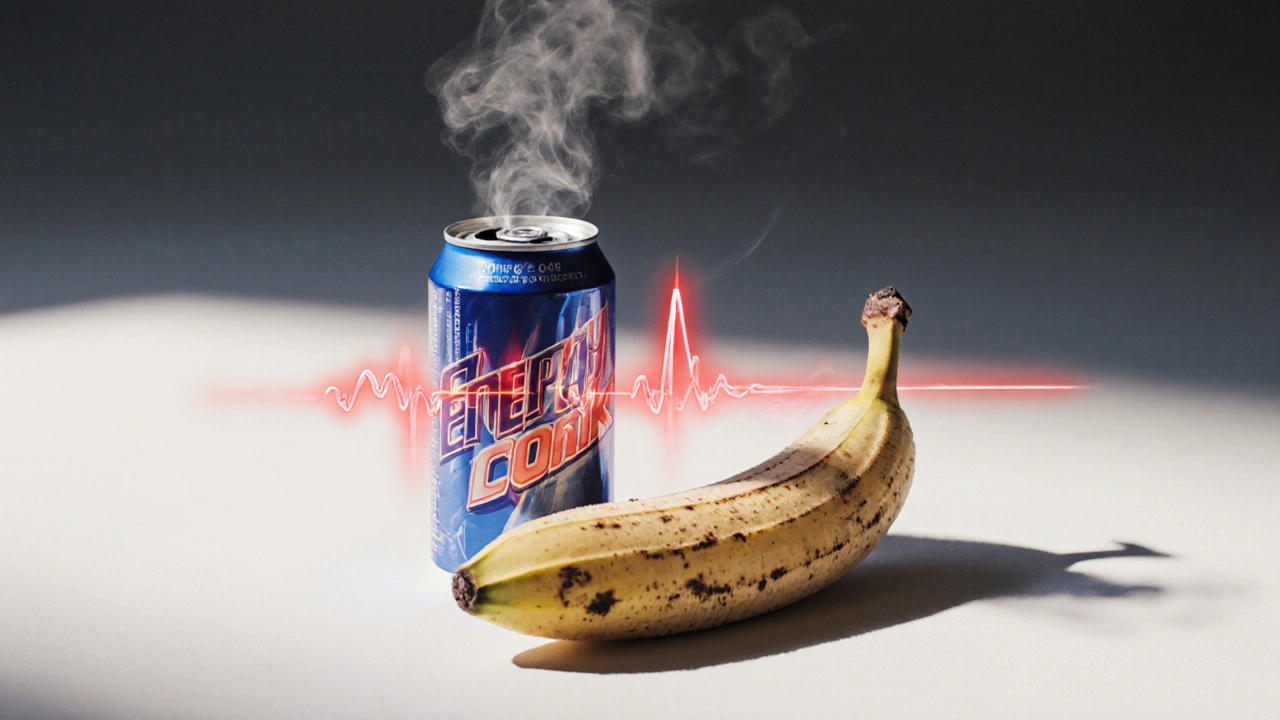
When your heart starts racing for no clear reason, it’s scary. That quick, fluttering beat-tachycardia-can happen after a cup of coffee, a stressful meeting, or even an energy drink. And when it does, people start looking for quick fixes. One common question: Do bananas help tachycardia? The answer isn’t simple, but it’s grounded in real biology.
What causes tachycardia?
Tachycardia means your heart beats faster than 100 beats per minute at rest. It’s not a disease itself-it’s a symptom. Common triggers include dehydration, stress, caffeine, nicotine, and yes, energy drinks. Many energy drinks pack 200 mg or more of caffeine in a single can. That’s more than two strong cups of coffee. Caffeine stimulates the nervous system, which can force your heart to speed up. Some energy drinks also contain high doses of sugar, artificial stimulants like taurine or guarana, and even yohimbine-all of which can push your heart rate higher.
But here’s the twist: not all tachycardia is dangerous. For some people, it’s just a temporary spike after a late-night study session or a pre-workout drink. For others, especially those with underlying heart conditions, it can be a red flag. That’s why understanding what’s causing it matters more than just trying to stop the symptom.
Why bananas come up in the conversation
Bananas are famous for their potassium. One medium banana has about 422 mg of potassium-roughly 9% of the daily recommended intake. Potassium is a key electrolyte that helps your heart muscle contract properly. Low potassium (hypokalemia) can cause irregular heartbeats, including tachycardia. That’s why doctors sometimes check potassium levels in people with unexplained rapid heart rates.
So when someone says, “Eat a banana,” they’re thinking: Maybe my heart is racing because I’m low on potassium. It’s a logical guess. But here’s the catch: most healthy people don’t get dangerously low in potassium from diet alone. Unless you’re vomiting, sweating excessively, taking diuretics, or have kidney disease, your potassium levels are likely fine. Eating a banana won’t fix tachycardia caused by caffeine or anxiety.
What actually helps during a tachycardia episode
If your heart is racing, what should you do? First, stop what you’re doing. Sit down. Breathe slowly-inhale for four seconds, hold for four, exhale for six. This activates your parasympathetic nervous system, which naturally slows your heart.
Hydration matters too. Dehydration thickens your blood and makes your heart work harder. Drink water-not more energy drinks. If you’ve just downed a can of something like Red Bull or Monster, your heart rate spike is probably from caffeine, not low potassium. Eating a banana now won’t cancel out the stimulant. It’ll just give you extra sugar and calories.
Real solutions for recurring tachycardia include:
- Avoiding energy drinks and high-caffeine products
- Managing stress through sleep, exercise, or breathing techniques
- Getting blood tests to check electrolytes, thyroid function, and heart markers
- Seeing a cardiologist if episodes happen often or feel severe
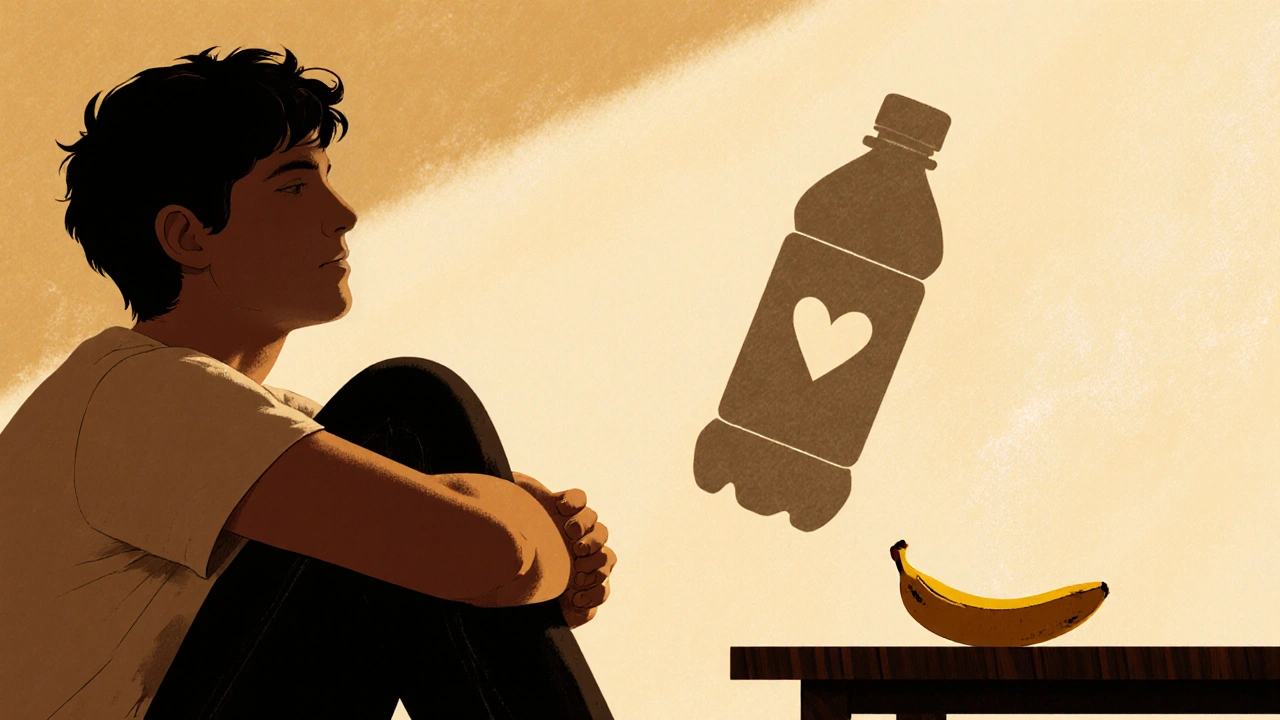
Can bananas prevent tachycardia long-term?
Potassium does support healthy heart rhythm over time. A diet rich in potassium-bananas, spinach, sweet potatoes, beans, and avocados-can help lower blood pressure and reduce the risk of arrhythmias. The American Heart Association recommends 3,500-5,000 mg of potassium daily for adults. Most people fall short. So yes, eating bananas regularly is a good habit.
But it’s not a magic shield. If you’re drinking two energy drinks a day, no amount of bananas will fully offset the stimulant overload. Potassium helps your heart function better, but it doesn’t block caffeine’s effects. Think of it like this: eating a banana is like putting good fuel in your car. But if you keep pouring gasoline into the engine while it’s already overheating, you’re not fixing the problem-you’re making it worse.
Energy drinks vs. bananas: the real comparison
Let’s put this in perspective. A typical energy drink has:
- 160-200 mg caffeine
- 27-54 grams of sugar
- 50-200 mg sodium
- Little to no potassium
A banana has:
- 0 mg caffeine
- 14 grams of natural sugar
- 1 mg sodium
- 422 mg potassium
One banana has more than double the potassium of what’s in most sports drinks-and zero stimulants. If you’re trying to replace energy drinks with something better, bananas are a smart choice. But not because they instantly calm your heart. They’re better because they don’t make it race in the first place.
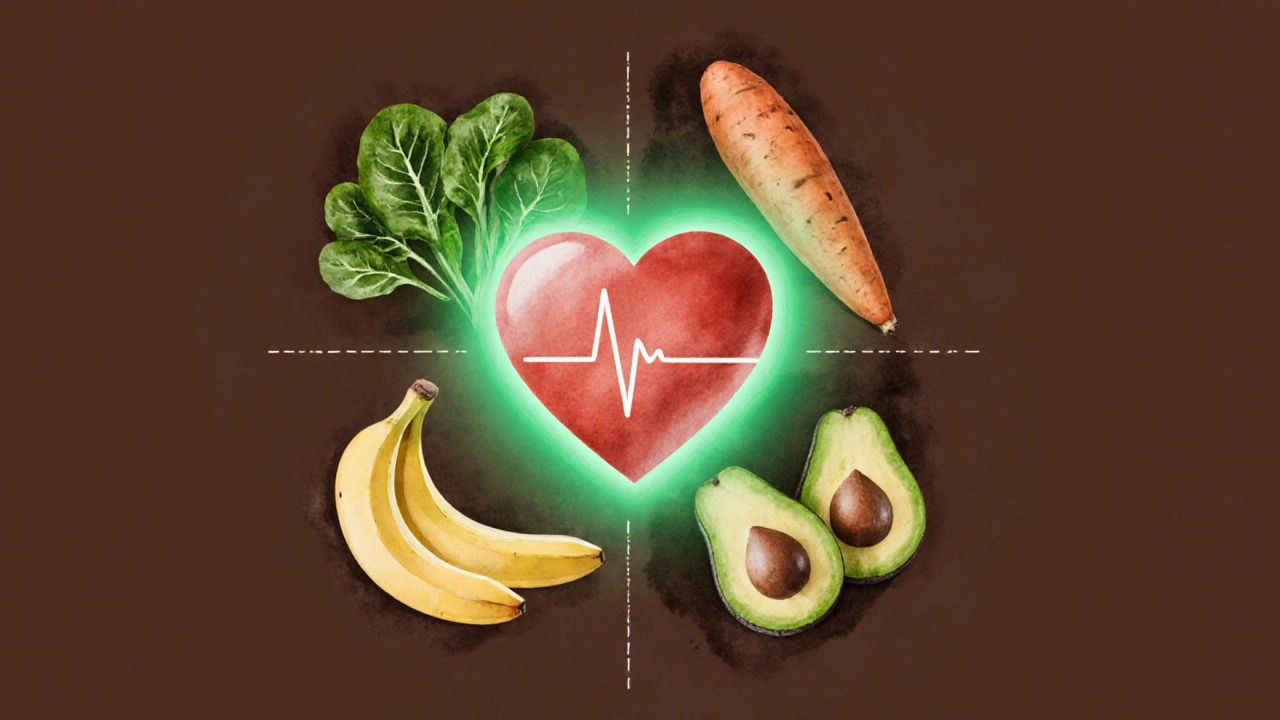
When to worry-and when to see a doctor
Most tachycardia episodes are harmless. But if you experience any of these, get checked:
- Heart racing for more than a few minutes without a clear trigger
- Dizziness, chest pain, or shortness of breath along with rapid heartbeat
- Episodes happening more than once a week
- Family history of heart rhythm disorders
Doctors can run simple tests-an ECG, a Holter monitor, or blood work-to find out if something deeper is going on. Don’t assume bananas will fix it. If your heart keeps acting up, it’s not a nutrition problem-it might be a medical one.
Bottom line: Bananas aren’t a cure, but they’re part of a better plan
So, do bananas help tachycardia? Not directly. Not right away. But if you’re replacing energy drinks with bananas-or other potassium-rich foods-you’re cutting out the trigger and supporting your heart in the long run. It’s not a quick fix. It’s a smarter lifestyle.
If you’re drinking energy drinks because you’re tired, ask yourself why. Are you sleeping enough? Are you stressed? Are you drinking enough water? Fix those first. Then, snack on a banana. Not because it’ll stop your heart from racing, but because it’s a real food that doesn’t trick your body into overdrive.
Your heart doesn’t need magic. It needs balance. And bananas? They’re just one piece of that.
Can eating a banana stop a sudden fast heartbeat?
No, eating a banana won’t stop a sudden episode of tachycardia. While bananas are high in potassium-which supports healthy heart rhythm-they don’t counteract the effects of caffeine or adrenaline that cause rapid heartbeats. If your heart is racing, focus on slow breathing, sitting down, and avoiding stimulants. A banana won’t hurt, but it won’t fix the immediate issue.
Are energy drinks linked to tachycardia?
Yes, energy drinks are a common trigger for tachycardia. Many contain 160-200 mg of caffeine per can, along with sugar, taurine, and other stimulants that increase heart rate. Studies have linked energy drink consumption to episodes of supraventricular tachycardia, especially in young people and those with no prior heart conditions. The American Heart Association warns against routine use of these drinks.
How much potassium do I need to support heart health?
Adults should aim for 3,500-5,000 mg of potassium per day, according to the American Heart Association. One banana provides about 422 mg. Other good sources include spinach (839 mg per cup cooked), sweet potatoes (542 mg each), white beans (595 mg per half cup), and avocados (708 mg per fruit). Most people don’t get enough-so eating potassium-rich foods regularly helps, but it’s not a quick fix for heart rhythm problems.
Is it safe to eat bananas if I have a heart condition?
Yes, bananas are generally safe and even beneficial for people with heart conditions-unless you’re on certain medications like potassium-sparing diuretics or have kidney disease. In those cases, too much potassium can be dangerous. Always check with your doctor before making big dietary changes, especially if you’re on heart medication.
What’s better than energy drinks for sustained energy?
Instead of energy drinks, try natural alternatives: a banana with a tablespoon of peanut butter, a handful of almonds, a glass of water with lemon, or a short walk. These provide steady energy without the crash or heart strain. Proper sleep, regular meals, and staying hydrated are the real foundations of lasting energy-not caffeine spikes.
If you’ve been relying on energy drinks to get through the day, try swapping one out for a banana this week. Notice how you feel. You might not notice a difference right away-but over time, your heart will thank you.

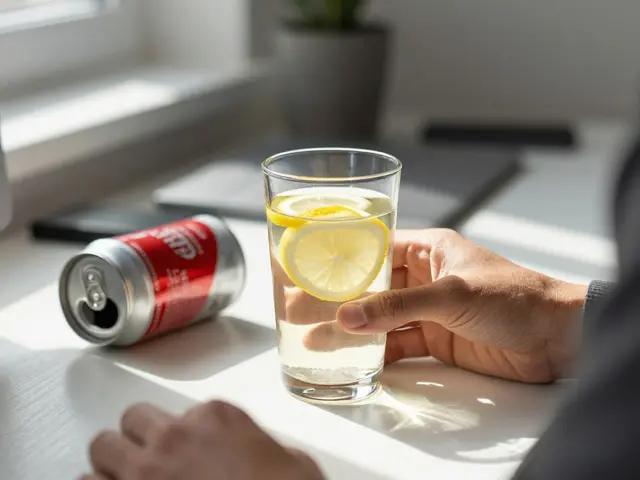
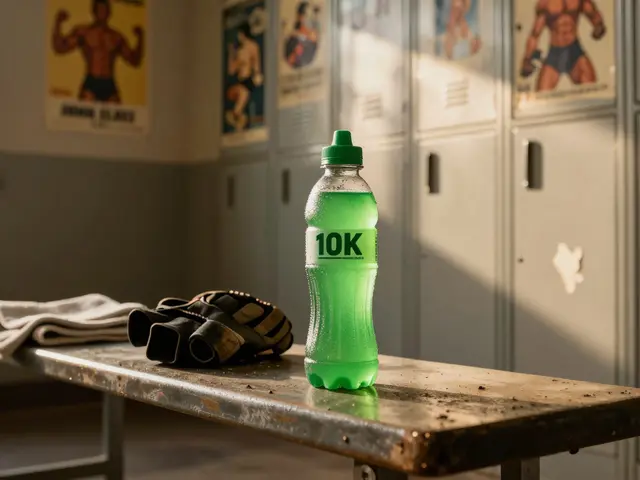
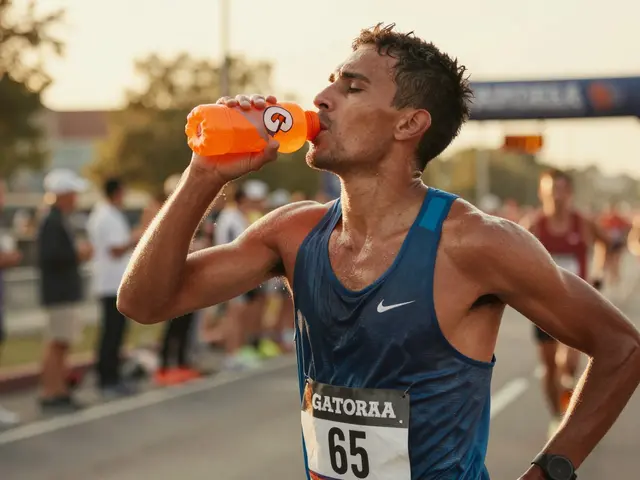
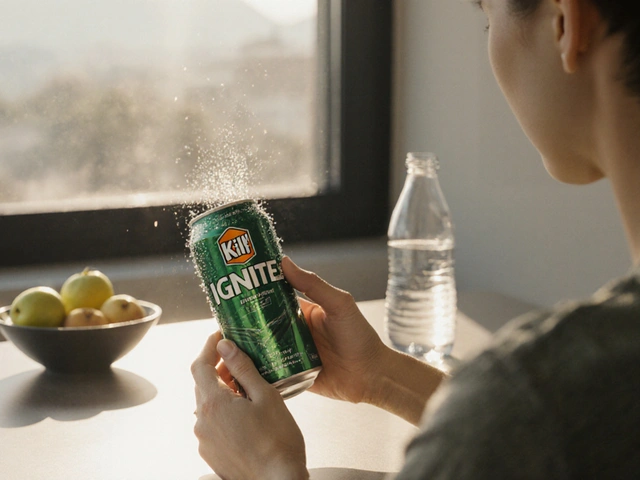
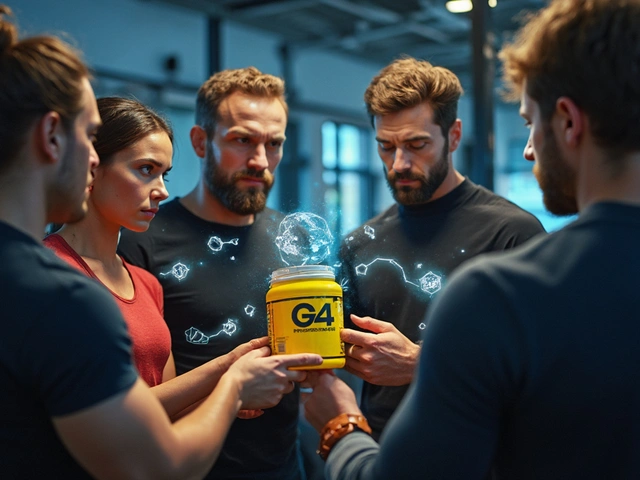
Comments (11)
Gabby Love
17 Nov 2025
Bananas won't stop a tachycardia episode mid-heart-race, but they're a damn good swap for energy drinks. I used to chug Monster just to get through my shift. Now I eat a banana and drink water. My heart hasn't felt like it's trying to escape my chest since.
Eva Monhaut
18 Nov 2025
I used to think bananas were just a lazy person's snack until I started tracking my heart rate after meals. No more 120 bpm spikes after lunch. Not because bananas are magic, but because I stopped eating sugar bombs. It's not about fixing symptoms-it's about removing the cause. Small changes, big difference.
mark nine
19 Nov 2025
Energy drinks are just caffeine with extra steps. Bananas are real food. That's all you need to know.
Rakesh Kumar
19 Nov 2025
In India we've been eating bananas with salt for centuries when feeling weak or dizzy. Not because we knew about potassium, but because our grandmas knew what worked. Science just caught up. Bananas aren't a cure, but they're a humble ally.
Michael Jones
21 Nov 2025
Look, we're all looking for shortcuts. Eat this, drink that, fix your heart with a snack. But the real problem isn't potassium deficiency. It's that we're running on fumes and calling it normal. We're sleep-deprived, dehydrated, and wired on sugar and stimulants. Bananas don't fix that. They just don't make it worse. That's the win.
We treat our bodies like machines you can juice up with chemicals. But hearts aren't batteries. They're living things. And they need rest, water, and real food-not a can of liquid adrenaline wrapped in neon.
I stopped drinking energy drinks after I passed out at my desk. Not because I read a blog. Because my body screamed. Bananas? Yeah, I eat them now. But only because I finally learned to listen.
Ryan Toporowski
22 Nov 2025
Just had a banana after my 3pm crash. No caffeine jitters. No crash later. Just calm energy. 🍌✨ Keep it simple.
Samuel Bennett
23 Nov 2025
Wait so now we're saying potassium prevents tachycardia? What about all the people with normal potassium levels who still get episodes? This is pseudoscience dressed up as nutrition. The real culprit is corporate marketing. Energy drink companies want you to believe you need their poison. Bananas are the new placebo.
Jen Becker
25 Nov 2025
So you're telling me I can't just chug a Monster and then eat a banana to cancel it out? That's not fair. I was counting on that.
Bill Castanier
27 Nov 2025
Hydration beats bananas. Drink water first. Then eat the banana. Not the other way around.
Rob D
27 Nov 2025
Who the hell is telling Americans to eat bananas instead of energy drinks? We're the land of the free and the home of the caffeine overdose. If your heart races, tough. You're weak. Drink more. That's the American way.
Tony Smith
28 Nov 2025
It is, indeed, a matter of profound societal significance that the collective reliance upon hyperstimulated, industrially engineered beverages has eclipsed the humble, naturally occurring potassium-rich fruit. One might posit that the modern American psyche has, through a confluence of convenience culture and corporate manipulation, come to regard the banana not as a nutritional ally, but as an archaic relic of pre-industrial dietary discipline. The fact that a single, unassuming fruit-unadorned by preservatives, flavor enhancers, or neon branding-is now positioned as a countermeasure to the pharmacological onslaught of energy drink formulations speaks volumes about the erosion of intuitive health wisdom. One does not cure a systemic behavioral disorder with a snack. One reorients one's entire relationship with sustenance, rest, and self-regulation. The banana, therefore, is not the solution. It is the symbol of the solution.